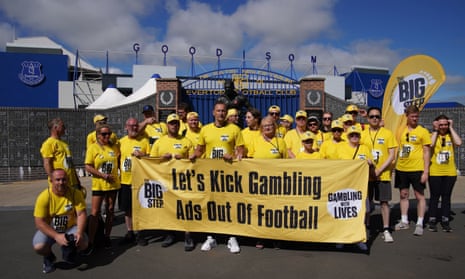Players to wear yellow laces in support of ban on gambling adverts in football
- FA Cup games among those to see the Big Step on-pitch protest
- Footballers will wear yellow laces to help press for action

British footballers will stage their first on-pitch protest against the effects of gambling harm this weekend, with more than 100 players showing support for a ban on advertising by bookmakers.
Players in FA Cup, Scottish Women’s Premier League Cup, Women’s Championship and non-league matches will wear yellow laces as they try to heighten the pressure on government to take action.
The League One side Forest Green will be part of the protest during their FA Cup first-round tie at South Shields, a match being shown live on the BBC. The club’s owner, Dale Vince, said his club were proud to support the initiative, organised by the pressure group The Big Step.
“Gambling companies are exploiting football and football fans, making huge profits at the expense of people’s lives,” Vince said. “Their overwhelming presence in our national sport is hyper-normalising an addictive harmful product, with only self-regulation to protect the millions of young fans exposed. This is something Forest Green Rovers stands against.
“We will proudly wear yellow laces this weekend to reinforce our support for the campaign to end all gambling advertising in football.”
Also wearing the laces will be Lewes Women, Glasgow City and the men’s non-league sides Dulwich Hamlet, Billericay Town, Llantwit Major, Headingley AFC and, on Tuesday, the Lewes men’s team. League Two Tranmere will warm up in yellow T-shirts before Saturday’s FA Cup first-round match against Carlisle.
The Big Step calls for an end to gambling advertising and sponsorship in football, a sport where young fans and viewers can be subjected to more than 700 gambling-related messages during a televised Premier League match. Recent Gambling Commission data showed that while overall levels of participation in gambling had remained stable over the past year, the percentage of 16- to 24-year-olds who identified as problem gamblers had more than trebled.
A review of gambling laws was commissioned by the Department for Digital, Culture, Media and Sport in 2020, with a ban on bookmakers’ logos on football shirts one mooted outcome. Two years later a white paper proposing reforms has been delayed four times and is yet to be published.
James Grimes, the founder of the Big Step and a former gambling addict, said: “This weekend is a bold reminder to the government that campaigners for gambling reform and our supportive football clubs are not going away until people can go to a match and support their heroes without being encouraged to gamble.”
